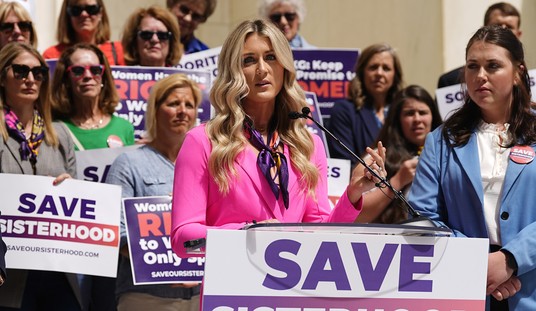
Speaker of the House Nancy Pelosi, D-Calif., departs the Capitol en route to a speaking event in Washington, Tuesday, Sept. 24, 2019. Pelosi will meet with her caucus later as more House Democrats are urging an impeachment inquiry amid reports that President Donald Trump pressured Ukraine to investigate former Vice President Joe Biden and his family. (AP Photo/J. Scott Applewhite)
You can easily surmise what Democrats really think by not paying attention to what they’re saying, but by paying attention to what they’re avoiding talking about.
If you listen to all the debates, tweets, and interviews that Democrats release during their road to the general election stage, you’ll notice a pattern. Big business bad, feminism good, free things good, LGBT good, Christians bad, environmentalism good, Republicans bad, so on and so forth. In truth, once you’ve seen one debate, you’ve more or less seen them all.
But throughout it, there’s one thing they don’t want to talk much about, and that one thing has generally been an election winner.
“It’s the economy, stupid.”
Looking back, a president’s chances of reelection shoot up dramatically if he’s overseeing a booming economy. People tend to not want to fix what ain’t broke and would like to continue seeing the rise in success they’re now accustomed to.
President Donald Trump’s economy is undeniably solid. Business leaders and economic experts tend to mostly agree. Very recently, Chase Bank’s CEO, Jamie Dimon, had serious praise to throw Trump’s way during his “60 Minutes” interview on Sunday.
“The consumer, which is 70% of the U.S. economy, is quite strong. Confidence is very high,” Dimon responded. “Their balance sheets are in great shape. And you see that the strength of the American consumer is driving the American economy and the global economy.”
(READ: Chase Bank CEO’s “60 Minutes” Interview Should Have Democrats Panicking About 2020)
Republican strategists believe rightly that Trump’s economy is his greatest strength, and want him to talk about it more.
“If Trump were to spend just one day a week and hammer the job numbers home, time and pressure would cause him to break through to move his approval rating upward,” said strategist Ron Bonjean told NBC News in May.
This economy has many experts believing that Trump is going to walk away with 2020 handily, some of whom aren’t really Trump fans such as chief economist at Moody’s Analytics, Mark Zandi.
“If the election were held today, Trump would win according to the models and pretty handily,” Zandi said. “In three or four of them it would be pretty close. He’s got low gas prices, low unemployment and a lot of other political variables at his back.”
(READ: Economic Experts See Trump Walking Away With Easy 2020 Victory)
It’s not just experts and strategists who are watching this and making assessments. The Democrats are, too.
They know just as well as anyone else that a strong economy is adding miles of steep terrain to their journey to the White House, and since they’ve gone down the route of socialism, they realize now that trying to compete with a Trump economy is about as likely as a gazelle chasing down and eating a lion.
“The most challenging thing in a presidential election is to be the party out of power when there’s a strong economy,” said UCLA’s Lynn Vavreck, who wrote a landmark study of how the health of economy affects presidential campaigns.
It’s a big losing issue, and thusly, Democrats would rather not talk about it too much, and if they do, it can never be in real terms.
For instance, Democrats and the media attempted to tell us all that a recession was on the way. It was a narrative that they attempted to establish with gusto back in August. The only problem is that there was no oncoming recession. The economy, which obeys the laws of undulation just like everything else, took a small dip, turning Democrats into Chicken Little. They wanted to tell the public as often as possible that a second recession was on the way, and Trump’s economic methods were to blame, despite the fact that almost every economic expert and business leader couldn’t find proof that we were headed for hard times.
“I think the word ‘recession’ is inappropriate because it’s just a word that certain people, I’m going to be kind, certain people in the media are trying to build up because they’d love to see a recession,” Trump said. “We’re very far from a recession.”
Evidence pointed to the fact that the left was actually hoping for one, and possibly even engineering one, which could happen if enough people act like one is coming.
“So one thing I’m looking closely at is whether the mood gets so out of sync with the data that the fear of recession becomes a self-fulfilling prophecy,” said San Francisco Fed President Mary Daly.
The narrative soon began to turn on the left, and it was quietly dropped. The recession myth died in the dark.
This hasn’t stopped the left from trying to gin up a reason to dismiss Trump’s economy. On Monday, CNBC attempted to sell you the idea that the economy won’t play that large of a role in the 2020 elections with an article titled “‘Not the economy, stupid’: A majority of Americans say 2020 election will be about other issues.”
Near two-thirds of Americans (61%) say the 2020 election will be about issues other than the economy, according to a CNBC and Acorns Invest in You survey conducted by SurveyMonkey and released Monday.
It’s only later that they reveal that they’ve taken non-economy issues and added them up to make it seem like people are more concerned about social issues — just like the Democrats — than the actual economy. When asked what matters most, the answer becomes clear:
Thirty-four percent of Americans say they will vote on the economy, and that percentage rises with political party taken into account, but not even a majority of Republicans (42%) say the economy will be the main issue in 2020. That figure drops to 27% for Democrats.
At the same time, when asked what issue “matters the most to you right now,” jobs and the economy is cited by 24% of Americans, No. 1 among all responses, followed by health care (21%), immigration (15%) and the environment (13%). These are the only issues receiving double-digit percentage support.
If the focus goes anywhere but the economy, that works for Democrats. If Trump and Republicans focus on the basic fact that their economy is the best in 50 years, as suggested by Bonjean, Democrats are going to have a hard time making a common political discussion not include the elephant in the room.
Focusing on Trump’s popularity is their strongest card at the moment, and they’re playing it with abandon. Impeachment proceedings and the constant deluge of accusations from him being racist to sexist have been playing out in the media ad nauseam. Even Zandi makes it clear that Trump’s greatest weakness is his popularity.
“The only exception is his popularity, which matters a lot. If that falls off a cliff it would make a big difference,” said Zandi.
Democrats seem to know that, and hammer it as often as humanly possible.
But even that might not be enough.
“People will vote for somebody they don’t like if they think it is good for them,” Mick Mulvaney said during a press conference.
This article isn’t meant to convince Republicans that 2020 is in the bag. I subscribe to the “it’s not over till it’s over” school of thought, and I’d remind everyone that Hillary Clinton thought it was in the bag too.
No, the point is simple. People like prosperity and we’re living it. Trump needs to talk about it more often than ever.














